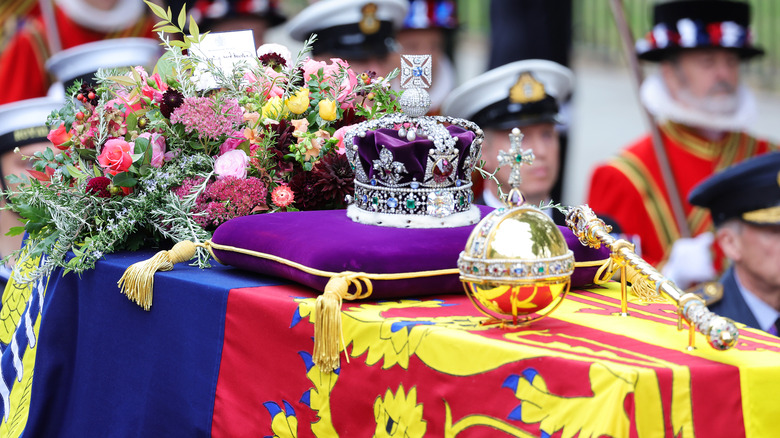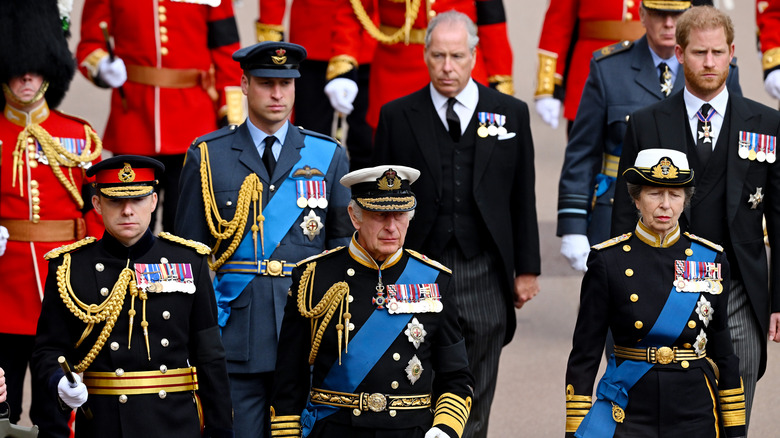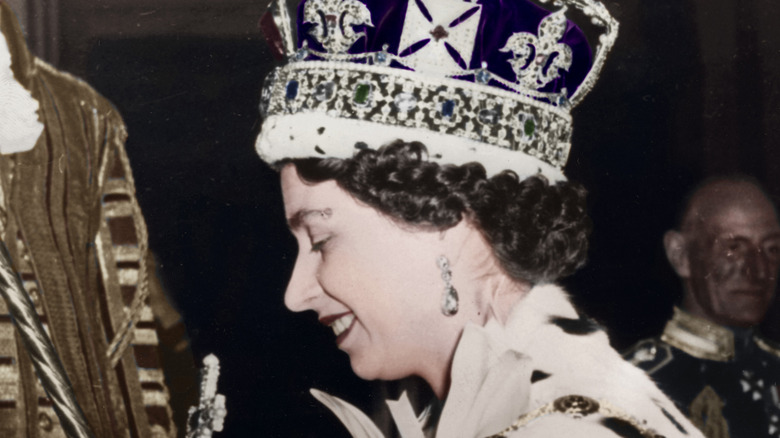The Royal Family Was Reportedly Stricter About The Queen's Funeral Coverage Than We Thought
On September 19, 2022, Queen Elizabeth II's funeral was broadcast by TV outlets from around the world. In the U.K., 28 million people watched the live proceedings and 11.4 million people tuned in the U.S. (via Newsweek). As noted by The Hollywood Reporter, it was the first time a funeral service for a British monarch was broadcast on TV. When George VI died in 1952, TV coverage was limited to the funeral procession.
In addition to the TV broadcast, many people watched the proceedings through streaming services and their phones (via The Guardian). During the days leading up to the service, viewers could even watch live feeds while the queen lay in state. Writing in The New York Times, TV critic James Poniewozik observed, "By 2022, viewers take divine omniscience for granted. If we can think of it, we should be able to see it."
So, when it was announced that the royal family placed limits on the British media regarding the funeral footage, journalists began expressing their dismay. Stewart Purvis, ITN's former editor called the decision self-censorship. "Once it's been transmitted, once we recorded in our own homes and our own video recorders and suddenly we're being told that certain sequences didn't happen, we can't show them again and it's just unrealistic," he told LBC, per The Guardian. Now longtime BBC presenter David Dimbleby is adding his voice to the criticism and shedding light on these restrictive royal requirements.
Buckingham Palace vetoed footage in 5-minute intervals during the funeral
Retired broadcaster David Dimbleby provided commentary during the BBC broadcast of Queen Elizabeth II's committal service. Dimbleby's late father, Richard Dimbleby, also worked for the outlet and covered both King George VI's funeral and Queen Elizabeth's coronation, per The Guardian.
Speaking at the Henley Literature Festival, Dimbleby criticized the royal family's restrictions over the reuse of footage from the queen's funeral. During the service, Dimbleby noted that the palace sent a steady stream of emails prohibiting clips from repeat viewings. "Prince George touching his nose, 'don't show it.' And it went on. Beatrice and Eugenie leaving St George's, 'not to be shown,'" the veteran presenter said, per Independent. "There was this complete list of things that no broadcaster could show because the copyright belongs to Buckingham Palace. I think that's wrong, just wrong. It's just interesting how tightly controlled monarchy is."
According to Newsweek, royal veto power lies in the location of the events. Venues such as Westminster Abbey and St. George's Chapel in Windsor are "royal peculiars," subject to the monarch's authority rather than the Church of England.
The Guardian reported royal staff reviewed footage every five minutes during the event. For future use, the palace limited media to an hour of footage. Coverage from the services at Westminster Abbey and Windsor Castle are allotted 12 minutes each. "We're furious that they're trying to restrict how people can relive somber but important historic events," one journalist told the outlet.
The royals have restricted the BBC's event coverage before
The BBC has been working with the royal family since 1924, when George V, Elizabeth II's grandfather, became the first British monarch to deliver a speech via radio. "Ever since the emergence of BBC Radio in the 1920s the royal family has trusted broadcasters, particularly the BBC, in a way that it didn't trust newspapers and it has benefited as a result from extremely positive coverage for much of the period," Professor Tim Luckhurst, principal of South College at Durham University, told Newsweek. Like David Dimbleby, Luckhurst also thinks the royals are making a mistake. "I think that seeking to exercise rather authoritarian control over footage that broadcasters have, after all, spent a fortune in creating is an unwise move and it's one that speaks of insecurity."
However, previous royal events have also come with caveats. When Queen Elizabeth II gave permission to televise her coronation, broadcasters were barred from covering the ceremony's ritual anointment, per The New York Times. Events have also been preserved in an edited form after their live presentation, such as the 2011 wedding of Prince William and Princess Catherine (via Newsweek).
In instances when the BBC has failed to comply with royal requests, the relationship has become more fraught. When the BBC turned down a request for an advance viewing of the documentary "The Princes and the Press," the royal family threatened to cease participating in future projects, per Daily Mail.


